Blogging Arak Son of Thunder 11: Valda Dances Right Out of Her Armor
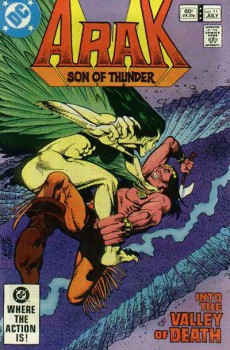 As I mentioned before, Arak Son of Thunder issue 11 (July 1982) was the first Arak comic I ever bought from a newsstand (or, more likely, off one of those revolving racks loaded with comics that convenience stores used to have). To my surprise, though, checking the publication date, I now realize that I have been incorrect about a particular autobiographical detail. I have usually characterized myself as having been ten or eleven years old when I was reading these comics. However, I didn’t turn ten until July 1982, and since the dating on comics and other periodicals is usually a month or two ahead of the actual date, I was only nine when I first read this one.
As I mentioned before, Arak Son of Thunder issue 11 (July 1982) was the first Arak comic I ever bought from a newsstand (or, more likely, off one of those revolving racks loaded with comics that convenience stores used to have). To my surprise, though, checking the publication date, I now realize that I have been incorrect about a particular autobiographical detail. I have usually characterized myself as having been ten or eleven years old when I was reading these comics. However, I didn’t turn ten until July 1982, and since the dating on comics and other periodicals is usually a month or two ahead of the actual date, I was only nine when I first read this one.
If you remember last week’s post, you’ll see that it makes a bit more sense, given my age at the time, that I found some of the illustrations (reproduced later in this post after the “Read More” jump-break) so shocking. But that’s a topic I covered last week (if you missed it, you can read it here). Today, I want to dive right in to summarizing the issue that made me an Arak fan.
This one is hands-down the best issue to date. The illustrations by Ernie Colón and Alfredo Alcala have never looked better; the plot points Roy Thomas has been setting up over the preceding year start to come together to create deepening mystery, suspense, and action against an epic, ever-expanding mythical background. Especially action. The plot is forwarded with new revelations (and new questions) while delivering nearly non-stop action from first page to last.
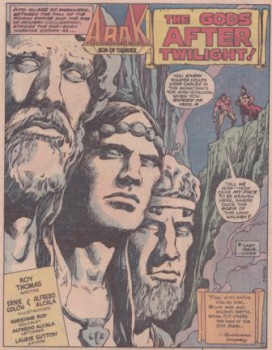 Splash page: Arak and Khiron the last centaur stand on a cliff atop Mount Olympus gazing at three Mount-Rushmore-like heads. The two flanking visages are of Greek heroes Asclepius and Hercules, but the face limned in the center is none other than Arak, though presumably carved ages ago.
Splash page: Arak and Khiron the last centaur stand on a cliff atop Mount Olympus gazing at three Mount-Rushmore-like heads. The two flanking visages are of Greek heroes Asclepius and Hercules, but the face limned in the center is none other than Arak, though presumably carved ages ago.
To recap how we got here: Arak and Valda have been on a quest to find the fabled city of White Cathay, where their friend the magician Malagigi was absconded to by a sorceress and her demons. Their journey brought them to the very foot of Mount Olympus and a run-in with a pack of bloodthirsty Byzantine soldiers, who were driven off by the fear-inspiring music of some mysterious pipes. While Arak and Valda slumbered for the night, the piping returned, this time seducing Valda away from their camp. Arak awoke to a half-man/half-horse fellow and proceeded to tussle with him all the way to the summit, where this staggering sight of his own face in stone awaited him.
Now: Arak wants some answers. So do we, but Khiron, like all such characters of this type, is rather reticent and selective in what he reveals.
Arak, to his credit, mainly just wants to know what the heck happened to Valda; everything else can wait. Khiron, on the other hand, wants to fill him in by slow, dramatic degrees on why they came to be brought together by fate, or by the hands of the gods.
Turns out the centaur has long served as mentor to prior sons-of-gods, like the other two memorialized on the mountainside. About Hercules, he recalls,
“ . . . strongest man who ever lived — and I was his teacher, too. Both of ancient wisdom and the bow. He became truly adept, alas, only at the latter. It was an arrow from his hot-tempered bow, in fact, which struck me down one day, more years agone than even I can count…and birthed the legend that I had been slain, my soul sent to loose its shafts among the winking stars.”
Since Khiron has long seen the visage of Arak up there with the others, he’s been expecting the lad.
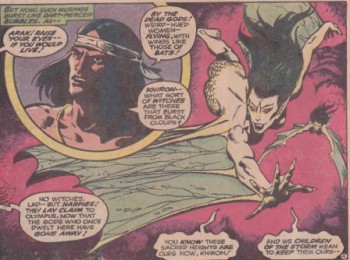 All of this might be quite intriguing to Arak under other circumstances, but given that he has only one person on his mind right now, Khiron is in danger of being thus abused by his next potential pupil before their lessons even begin:
All of this might be quite intriguing to Arak under other circumstances, but given that he has only one person on his mind right now, Khiron is in danger of being thus abused by his next potential pupil before their lessons even begin:
“Now, I’ll ask you one question more, Khiron,” Arak declares, “and you may pray I like your answer. Where is the warrior woman Valda who slept beside me, and who was gone when I awoke staring at your hooves? Answer me, man-stallion!”
This only gets him another enigmatic “I choose which questions I answer, Arak.”
More threats from Arak, and just when Khiron seems about to quit playing the riddling cat and speak straight from the horse’s mouth (sorry, couldn’t help it; my fingers typed it before my brain could circumvent it), the pair are attacked from above by harpies!
Now things get really cool.
Colon’s harpies are both monstrously frightening and way sexy.
“By the dead gods!” Arak declares. “Weird-hued women — flying, with wings like those of bats! Khiron, what sort of witches are these that burst from black clouds?”
Khiron corrects him: “No witches, lad — but harpies! They lay claim to Olympus, now that the gods who once dwelt here have gone away!”
Confirming this, a harpy hisses (you know it’s a hiss because of the wavy way the word balloons are drawn), “You know these sacred heights are ours now, Khiron! And we children of the storm mean to keep them ours — nor shall it pain us overmuch to kill for them!”
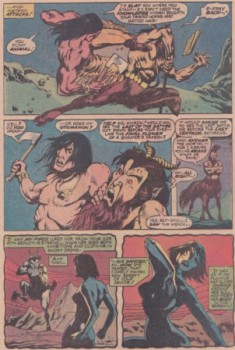 In a beautifully rendered panel, three harpies lift Khiron straight off the ground, prompting Arak to utter the warning, “Release him, you gossamer devils — aye, and safely, too! Else, by Othin’s good eye, I’ll forget that you are women — and let my otomahuk do my speaking for me!”
In a beautifully rendered panel, three harpies lift Khiron straight off the ground, prompting Arak to utter the warning, “Release him, you gossamer devils — aye, and safely, too! Else, by Othin’s good eye, I’ll forget that you are women — and let my otomahuk do my speaking for me!”
As both warriors are snatched up into the sky, Khiron helpfully explains to Arak that they are not, in fact, women, but “only monsters in women’s guises.”
The obvious disadvantage our heroes have to fighting back is that, as soon as they do, the harpies drop them (and no ring of featherfall handy). Fortunately for both, they are dropped on “snowcapped peaks, not rocky crags.” The harpies fly away, and the two warriors reconnoiter.
Arak observes the corpse — now reduced to a skeleton — of the harpy that Khiron brought down with him, and Khiron explains, “The harpies are among the vilest of the few races which still remain from the oldentime, Arak. When they perish, the very universe rejects their blood and their flesh, as swiftly as possible.”
Ahhhh, Thomas sure has fun with this stuff.
Arak just won’t let up; he immediately resumes pestering Khiron about Valda. To which Khiron responds, “What I know, boy, I know.”
This is just as irritating to Arak as it would be to you: “You make my gorge rise again, centaur!” And now we’re starting to have some idea of why Hercules, back in the oldentime, might have shot Khiron with his “hot-tempered bow.”
Khiron then pulls a classic changing-the-subject move, so he can slip in some vital information while he has Arak’s full attention:
“That would be a pity indeed, since I have awaited your coming so long. It is not given to me to know all, let alone to tell all…Still, you should know that, like another warrior or two before you, you are a blood-son of the very thunder itself!”
This piercing at the very core of his existential search, it does throw Arak off for a moment. “Am I, Khiron? I was told once that I am, but — ”
Arak suddenly gives in to “an impulse strong as Hercules’ thews or Asclepius’ potent cures,” lifts his weapons in the air, and demands that the gods themselves answer the question of who he is:
“Hear me, you who are the thunder overhead — whether your name be He-No or Thunor or Zeus, or whether you have no name — if you are my father — and if you did not die when the Quontauka who worshipped you died — then speak to me now! Write your name with lightning across the heavens, that I may read it and know that I am truly what some have called me — THE SON OF THUNDER!”
In response to this demand, here is what we see on the page, as helpfully also described by the narration: “The next moment, with a roar like that of a world-devouring beast, a bolt of fire arcs angry and golden from out the very heavens — and cleaves the carven faces which loom high above them!”
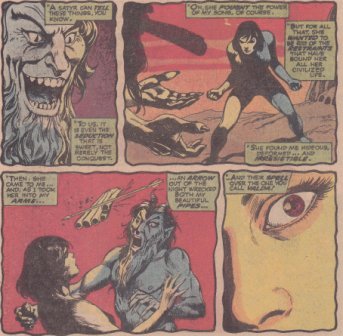 Arak is not quite sure what to make of that display, how to interpret it, and Khiron advises him “to give it a little time,” but now Arak is back on his first kick: finding Valda.
Arak is not quite sure what to make of that display, how to interpret it, and Khiron advises him “to give it a little time,” but now Arak is back on his first kick: finding Valda.
And now, finally, Khiron acquiesces, seeing that he’s never going to get far in this mentoring business while Arak is all worked up about Valda. So the centaur deigns to allow Arak to mount him (that sounds like something different than what I meant), and off they go to find her.
Who they find instead is Satyricus, last of the satyrs.
The ensuing interaction between Khiron and Satyricus provides a good deal of entertainment, as they hurl insults at each other that seem to veil a begrudging respect, being two of the last of their kind.
Satyricus: “You’ll learn precious little about me from that pompous beast of burden you ride, mortal. He and I have not exchanged so much as a kind word in — how long has it been, Khiron?”
Khiron: “Not nearly long enough, Goat-Legs.”
Satyricus: “You see? He has never forgiven me for hobnobbing with some Romans a few centuries ago . . . ”
Khiron: “It was depressing, Satyricus, to see a Grecian satyr reduced to nothing more than a decadent Roman faun.”
And so on.
Arak levels the same threats against him that he used on Khiron, but far more effective in quickly getting the satyr’s tongue wagging.
Now we get Valda’s flashdance scene in flashback. Whoa nelly.
Satyricus, the horny little goat, does reveal some insight to Valda’s psyche as a warrior-woman in a man’s world:
“It was my pipes lured her from your side with seductive strains…made her shed both inhibitions and clothing, in short order. And then…she danced! Ah, how she danced, that comely maiden now bereft of cold armor! It was as if my playing had sliced chains around her soul, and freed her body in the bargain! A satyr can tell these things, you know. To us, it is even the seduction that is sweet, not merely the conquest. Oh, she fought the power of my song, of course. But for all that, she wanted to be rid of the restraints that have bound her all her civilized life. She found me hideous, deformed…and irresistible.”
As with prior seduction attempts by inhuman beings, though, something intervenes. In this case, an attack by one-eyed Captain Brutus and his men. They took Valda hostage, and Satyricus barely escaped.
Arak impresses on Satyricus the judiciousness of immediately leading them to where the Byzantines are encamped (and gets a chance to use some slurs on somebody else for once, having been so often on the receiving end of racial slurs like “red devil.” He calls Satyricus a “filthy animal,” “goat-legs,” and anything but “Satyricus”).
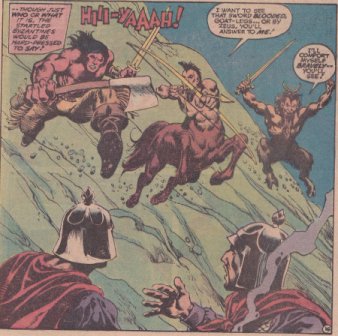 When the Indian-Viking-warrior and his two half-animal companions from myth storm the camp, it is a sight to behold. They make short work of the soldiers, but Captain Brutus has already left with his captive to the main camp.
When the Indian-Viking-warrior and his two half-animal companions from myth storm the camp, it is a sight to behold. They make short work of the soldiers, but Captain Brutus has already left with his captive to the main camp.
In the final scene, a truly poignant one at that, Khiron saves Satyricus from an attacker, explaining, “If I haven’t slain you myself in all these years, do you think I would let a lesser being do so?”
Satyricus responds in kind: “Well spoken — friend! When this is done, we’ll raise a flagon of Ambrosia to — Khiron! LOOK OUT”
Too late, Khiron’s back is pierced by a fleeing archer’s last potshot.
Arak looks on as Satyricus cradles the centaur. The narration observes:
“Satyricus pays no heed to anything human — not even Arak — as he cradles the gravely-wounded Khiron in his arms, and looks into glazed centaur eyes. And he knows that, if Khiron dies, the world for him will be an even lonelier place than it has been for centuries gone by…!”
NEXT ISSUE: DEATH AND VENGEANCE!
MONSTER TALLY: 3 (centaur; harpies; satyr)
[…] Blogging Arak Son of Thunder 11: Valda Dances Right Out of Her Armor […]